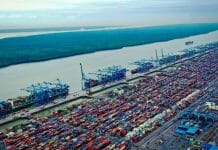
Experts agree that local manufacturers should make the transition to becoming ‘smart factories’ to gain a competitive edge over regional competitors in the post-pandemic environment currently challenged also by supply chain issues.
IBM Malaysia managing director and technology leader Catherine Lian (centre in main pic) said that Industry 4.0 (IR4.0) is revolutionising the way companies manufacture, improve, and distribute their products.
“Manufacturers which embrace IR4.0 principles and new technologies – including Internet of Things (IoT), cloud computing and analytics, artificial intelligence (AI) and machine learning – into their production facilities and throughout their operations have distinct advantages over competitors which are slow to adapt accordingly,” said Catherine.
“Such smart factories are equipped with advanced sensors, embedded software and robotics that collect and analyse data for better decision making. Even higher value is created when data from production operations is combined with operational data from enterprise resource planning (ERP), supply chain, customer service and other enterprise systems to create whole new levels of visibility and insight from previously siloed information,” she added.
Catherine urged local manufacturers to embrace such technologies as they lead to increased automation, predictive maintenance, self-optimisation of process improvements and, above all, a new level of efficiencies and responsiveness to customers not previously possible.
“Of all the IR4.0 technologies, cloud computing is the ‘great enabler’ that goes way beyond speed, scalability, storage, and cost efficiencies, and provides the foundation for most advanced technologies that gives businesses the means to innovate,” said Catherine.
“The data that fuels Industry 4.0 technologies resides in the cloud, and the cyber-physical systems at the core of Industry 4.0 use the cloud to communicate and coordinate – especially hybrid cloud models which leverage public and private resources to maximise productivity and cost-savings while substantially reducing privacy, security and latency issues,” she added.
Last month (June 2022), the department of statistics reported that Malaysia’s manufacturing sales value in April 2022 stood at RM147.9 billion, rising 13.2 per cent as compared to the previous year.
This rise was driven spearheaded by the electrical & electronics sector (21.9%) followed by food and beverages (14.9%) and petroleum chemical, rubber & plastic products (6.7%). On a month-on-month basis, the sales value increased 2.3 per cent.
“Although the manufacturing sector is experiencing growth compared to the pandemic environment, Malaysia could again establish itself as a manufacturing powerhouse if more businesses embrace ‘smart factory’ models,” she said.
“Developing smart factories provides an incredible opportunity for the manufacturing industry to enter the fourth industrial revolution. Analysing the large amounts of big data collected from sensors on the factory floor ensures real-time visibility of manufacturing assets and can provide tools for performing predictive maintenance in order to minimise equipment downtime,” said Catherine.
Meanwhile, National Tech Association of Malaysia (PIKOM) secretary and Glocomp Systems (M) Sdn Bhd executive director Alex Liew (left in main pic) said that vast improvements in connectivity means that manufacturing today can have an interconnected network of machines, communication mechanisms, and computing power.
“The smart factory is a cyber-physical system that uses advanced technologies that can operate on-premise, but could also connect to a global network of similar systems,” he said.
“Manufacturing has always involved high-speed decision making due to constant change and data.
“Using high-tech IoT devices in smart factories made possible by powerful connectivity networks today leads to higher productivity and improved quality,” added Alex.
“Replacing manual inspection business models with AI-powered visual insights provides greater accuracy, saving time and money and quality control personnel are empowered to monitor manufacturing processes from virtually anywhere from their smartphones – all thanks to powerful connectivity and cloud computing.”
Meanwhile, industry veteran and Commerce.Asia executive chairman Ganesh Kumar Bangah (right in main pic) said that, by applying machine learning algorithms, manufacturers can detect errors immediately, rather than at later stages when repair work is more expensive.
“Industry 4.0 concepts and technologies can be applied across all types of industrial companies, including discrete and process manufacturing, as well as oil and gas, mining and other industrial segments,” said Ganesh.
“The era of IR4.0 is set to completely revolutionise the manufacturing sector due to the automation, monitoring, and analysis of supply chains through smart technologies,” he further said.
“IR4.0 doesn’t stop at the supply chain. It inter-connects with back-end systems, like enterprise resource planning (ERP), to give companies an unprecedented level of visibility and control.”
He explained that, since the 1800s, the world had experienced three industrial revolutions that completely revolutionised how goods were produced and how work was done. “Each industrial revolution was powered by a disruptive new technology: The mechanics of the steam engine, the innovation of the assembly line, and the speed of the computer.”
“Ultimately, it is a major part of any company’s digital transformation,” he added.








